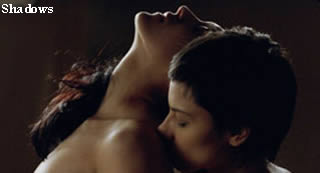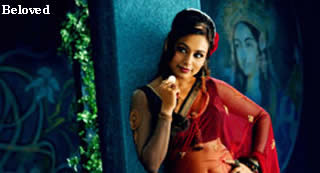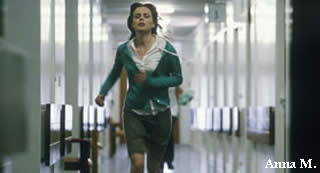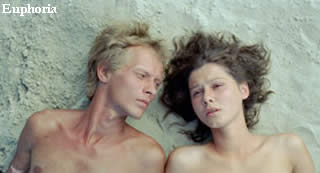 also served as the Director of the Goodwill Games Film Festival, the Women in Cinema Festival and the Washington State Centennial Film Festival.
also served as the Director of the Goodwill Games Film Festival, the Women in Cinema Festival and the Washington State Centennial Film Festival.Cinema Without Borders: In Palm Springs International 2007 international cinema had a very strong presence, how is it in 2008 festival?
Darryl Macdonald: International cinema is the heart and soul of this Festival, always has been; of the 222 films in this year’s lineup, 175 of them come from 65 different countries around the world. We’ve got particularly strong representation this year from a number of countries – Israel, Italy, France and Spain among them, and a very strong sidebar of Latino cinema, with an emphasis on films from Central and South America – among them Brazil, Argentina and Mexico, all of which had a strong filmmaking year, with a lot of exceptional young talents emerging. The same is true of Israel and Italy.CWB: Please tell us about international filmmakers attending the festival.
Darryl: The confirmed guest list is still being added to on a daily basis, with two weeks to go until opening night, but it’s safe to say we’ll have close to 200 filmmakers representing virtually every region and area of the world attending the event over the course of the Festival’s twelve-day run.CWB: At Palm Springs ShortFest it was easy to meet the filmmakers in a casual and friendly environment, a great advantage over many other festivals, should we expect the same at Palm Springs International Film Festival?
Darryl: That’s what it’s all about; the filmmakers who attend the Festival are here for the audiences – apart from the in-theatre Q&A;’s with audiences after their screenings, the filmmakers who are here go to the Festival screenings and attend all events. The Festival is in a fairly concentrated area, and our visiting filmmakers are just as likely to be run into in lineups at the theatres, walking up and down the streets of the village and eating in restaurants throughout the town.
 CWB: What is the festival’s international cinema related awards and events?
CWB: What is the festival’s international cinema related awards and events?
Darryl: Special showcases include New Voices/New Visions; Modern Masters; the Awards Buzz series, which includes 55 of the 63 official foreign language Oscar submissions; Cine Latino (Spanish and Portuguese language films); New Israeli Cinema (11 films, including award winners from this year’s Cannes, Berlin, Sundance, Tribeca, Montreal, and Tokyo Filmex Festivals); and World Cinema Now, our largest programming section, with 77 films from 38 different countries.
Awards include the FIPRESCI Prize (Foreign Language Film, Actor and Actress), New Voices/New Visions Award (for international filmmakers making their first or second narrative feature film), the John Schlesinger Award ( for first documentary or narrative feature), our Audience Award for Best Narrative Feature (which inevitably goes to a international film – last year’s winner was “The Lives of Others”) and, of course, the Bridging the Borders Award (sponsored by Cinema Without Borders, and presented to a film that promotes international understanding between the peoples and nations of the world).
by Cinema Without Borders, and presented to a film that promotes international understanding between the peoples and nations of the world).
CWB: How strong is presence of independent cinema at the festival?
Darryl: There are no major studio movies at this Festival, if that is what you mean, with the exception of our archival offerings: Frank Borzage’s “Seventh Heaven” (1927), Josef von Sternberg’s “Crime and Punishment” (1935), and John M. Stahl’s “Leave Her to Heaven” (1945). Apart from those – and quite probably Lucian Pintilie’s Reenactment (Romania, 1968) – every film in the Festival is a film in which the Director retained the right to final cut, which is probably the only reasonable definition of ‘independent’ film left, now that money or the source of money has blurred the lines. This festival is devoted to the directors’ vision, as the main creative spirit behind the finished film.
 CWB: What is the festival’s independent cinema related awards and events?
CWB: What is the festival’s independent cinema related awards and events?
Darryl: Apart from the awards already mentioned, we’re presenting John Sayles, who I think truly embodies what the term “American independent” means, with our American Maverick Award. Also we are presenting a Heineken Red Star Award, to to support and empower up-and-coming filmmakers, and celebrate their passion and achievement. This Award recognizes originality, innovation and vision. As for events, every event in the Festival – with the exception of our opening weekend Black Tie Awards Gala (the Festival’s major annual fundraiser, this year presenting awards to Sean Penn, Daniel Day Lewis, Halle Berry and Joe Wright, among others) – is a celebration of independent cinema.
CWB: Are Palm Springs film fans interested in attending the screening of international films? 
Darryl: Considering the fact that last year’s attendance reached 120,000, making it the third largest festival in America (after only Seattle and Tribeca), I guess you’d have to say that Palm Springs film fans are indeed interested in attending the screening of international films.
CWB: What’s new in 2008 festival?
Darryl: Our first free outdoor screening (a sing-along version of “Hairspray”), our first silent film presentation with live musical accompaniment (Frank Borzage’s “Seventh Heaven”, with a new score composed by Paul Gilman) – both screenings are part of our film music theme this year, along with a panel on film scoring and a broad selection of films encompassing music themes or personalities.
 CWB: Any new faces in your crew?
CWB: Any new faces in your crew?
Darryl: Helen du Toit has come on board as our new Co-Director of Programming; she’s been with us in the past (both as Programming Director for ShortFest in 2004 and as a Programmer and Programming Manager of the 2004 and 2005 Film Festivals) but left the Festival to pursue film production in early 2005. It’s great to have her back. Also Hebe Tabachnik has joined the team as our Cine Latino Programming Associate. We have a number of new people in various departments of the Festival staging staff, but those are the ones you’ll be seeing most prominently.
CWB: What do you expect from 2008 festival?
Darryl: What I always expect: that it will be one of the most outstanding film events in the world this year, and a great cultural event for audiences that is devoted to the discovery of emerging talent and the cause of raising people’s consciousness about the world outside of America.

